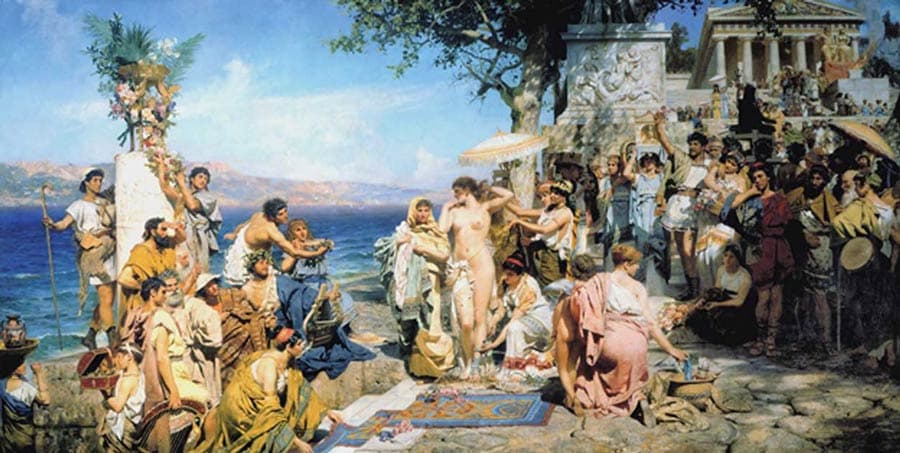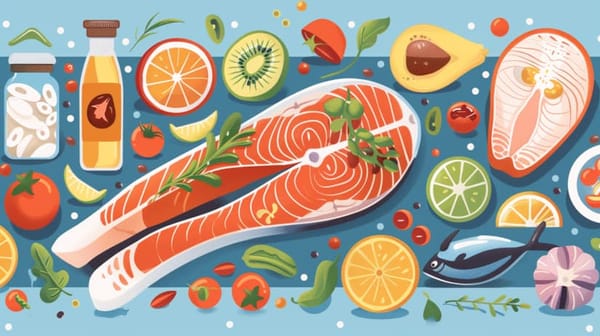For some at the commencement of acute diseases have taken food on the same day, some on the next day; some have swallowed whatever has come in their way, and some have taken cyceon. - Hippocrates, On Regimen in Acute Diseases
Hippocrates makes mention of kykeon many times in his works - and I believe that he also understood the importance of psychedelics (or the better term may be psychoactive alkaloids). If you've been following my work, you've probably noticed that I believe that psilocybin mushrooms are one of the fastest keys (biohacks) to fixing a dysregulated nervous system. I know that it may not be everyone's cup of tea, but it's important to me. I think that simply the ability to balance your right and left brains, along with nervous system stability is enough to warrant most people to try it (as long as the prefrontal cortex is fully developed). Even simply as a microdose-styled approach. But it also has a lot of other extremely beneficial side effects.
You'll notice that a lot of synergies come into play when mixing fasting and psilocybin - Showing us that these insights were long known in ancient Greece, and are attributed to many of the most well-respected philosophers. (and not to mention the pinecone on the Pope's ferula staff or Mozart/Beethoven and their association with freemasonry, and psychedelic rituals ;) So let's dive into this a little bit, but let's also dissect some of Hippocrates' views on fasting and see what wisdom we can pull out.
What is Kykeon?
Kykeon (Ancient Greek: κυκεών, kykeȏn; from κυκάω, kykáō; "to stir, to mix") was an Ancient Greek drink of various descriptions. Some were made mainly of water, barley, and naturally occurring substances. Others were made with wine and grated cheese. It is widely believed that kykeon usually refers to a psychoactive compounded brew, as in the case of the Eleusinian Mysteries. A kykeon was used at the climax of the Eleusinian Mysteries to break a sacred fast, but it is also mentioned as a favorite drink of Greek peasants.
Kykeon is mentioned in Homeric texts: the Iliad describes it as consisting of Pramnian wine, barley, and grated goat's cheese. In the Odyssey, Circe adds some honey and pours her magic potion into it. In the Homeric Hymn to Demeter, the goddess refuses red wine but accepts kykeon made from water, barley, and pennyroyal.
What is Pennyroyal? Mentha pulegium, commonly pennyroyal, or pennyrile, also called mosquito plant and pudding grass, is a species of flowering plant in the mint family, Lamiaceae, native to Europe, North Africa, and the Middle East. Crushed pennyroyal leaves emit a very strong fragrance similar to spearmint.
What were the Eleusinian Mysteries?
The Eleusinian Mysteries were religious ceremonies held in ancient Greece, particularly in Eleusis, near Athens, and were known for their secretive nature, involving initiation rites into the mysteries of Demeter and Persephone.
The Eleusinian Mysteries were ancient religious ceremonies held annually in Eleusis, near Athens, Greece, and were among the most significant rites in ancient Greek religion. These Mysteries were dedicated to Demeter, the goddess of agriculture, and her daughter Persephone, revolving around their myth which explained the seasons. The ceremonies symbolized the cycle of life, death, and rebirth, reflecting agricultural cycles and spiritual beliefs about the afterlife.

The Mysteries were divided into two parts: the Lesser Mysteries, which were preparatory, held in the spring, and the Greater Mysteries, held in the fall. Participation was open to all free people who spoke Greek, regardless of gender or social status, provided they had not committed murder or similar serious crimes.
The exact details of what occurred during the Mysteries were kept secret by the initiates, but it is known that the ceremonies included a series of rites, rituals, dramatic performances, and processions. Initiates underwent a series of stages of revelation, including purification rites, fasting, the revealing of sacred objects, and possibly the consumption of a psychedelic potion known as "kykeon," leading to transformative and mystical experiences.
The central theme of the Eleusinian Mysteries was the promise of life after death and the hope for a blessed existence in the underworld, which was a significant departure from the generally gloomy Greek view of the afterlife. This promise of personal salvation and the direct experience of divine power made the Mysteries an essential part of ancient Greek spirituality for nearly two thousand years.
Plato, in particular, saw the Eleusinian Mysteries as a source of philosophical insight and moral teaching. In his dialogue "Phaedo," for instance, he implies that the Mysteries offer initiates knowledge about the afterlife that is both hopeful and enlightening. The Mysteries, with their themes of death and rebirth, align with Plato's beliefs about the soul's immortality and its journey after death.
In "The Republic," Plato also uses the imagery of initiation into the Mysteries to describe the philosopher's journey toward understanding and enlightenment, likening philosophical education to a spiritual initiation that leads one out of the darkness of ignorance and into the light of knowledge and truth.
Fasting and Kykeon
It was supposed to have digestive properties: In "Aristophanes' Peace" Hermes recommends it to the hero who ate too much dry fruit and nuts (another clue). This means that my magic mushroom protocol that includes peppermint tea correlates to kykeon which was used during the Eleusinian mysteries. (Sometimes I surprise myself...)
However, before I pat myself on the back too hard, it does seem like common sense when you take into consideration the digestive discomfort felt by many who take things like psilocybin mushrooms, so naturally pairing it with a digestive drink makes sense. In my most intense protocol for retraining the nervous system with stressors, I specifically break the dry fast and sauna session with a lot of peppermint and chamomile tea (as described in the protocol and not for beginners). It has taken a little bit of trial and error but I love how intune I have become with my body and it is inspiring that my intuition moves naturally in the right direction (that being with our ancient Greek pursuers of truth).
Hippocrates insights on Fasting and Refeeding
Now all these things are worse than if one had observed a different regimen; and yet these mistakes, committed at that time, do much less injury than if one were to abstain entirely from food for the first two or three days, and on the fourth or fifth day were to take such food; and it would be still worse, if one were to observe total abstinence for all these days, and on the following days were to take such a diet, before the disease is concocted; for in this way death would be the consequence to most people, unless the disease were of a very mild nature. But the mistakes committed at first were not so irremediable as these, but could be much more easily repaired. This, therefore, I think a strong proof that such or such a draught need not be prescribed on the first days to those who will use the same draughts afterwards. At the bottom, therefore, they do not know, neither those using unstrained ptisans, that they are hurt by them, when they begin to swallow them, if they abstain entirely from food for two, three, or more days; nor do those using the juice know that they are injured in swallowing them, when they do not commence with the draught seasonably. But this they guard against, and know that it does much mischief, if, before the disease be concocted, the patient swallow unstrained ptisan, when accustomed to use strained. - Hippocrates, On Regimen in Acute Diseases
Now let's dissect this.
Dissecting Hippocrates' insights with Dry Fasting in mind
The Risk of Total Abstinence Early in Illness
Completely avoiding food for the first two or three days of an illness, followed by an abrupt reintroduction of food, can lead to worse outcomes, potentially even death, unless the illness is very mild.
Hippocrates basically answers one of the questions I see VERY often. What do I do if I get sick when I first start the fast? Here we see an example associated with severe illnesses. Hippocrates would not have known the correlation between 48-72 hours of fasting and immune system suppression, yet he must have witnessed many people getting bad outcomes when ending the fast around this timeframe while still ill.
This makes perfect sense. In my protocols, and especially the scorch protocol I talk a lot about the 'vulnerability window'. In this case, we see this window in action. During the fast, you upregulate ketosis and autophagy to such high levels that they deal with pathogens very efficiently (check out xenophagy). But if you exit too quickly while still sick, you stop that mechanism PLUS you are not in a suppressed immune state. This is why so many people relapse or re-flare right after a fast. You need to understand this to balance and plan your next fasting endeavors. Look into my antiviral recommendations in the Scorch Protocol.
Comparative Harm of Dietary Choices
The text suggests that mistakes made at the onset of illness are more manageable and less detrimental than those made by abstaining and then abruptly reintroducing the wrong diet before the illness is properly "concocted" or digested.
This correlates once again to findings in recent fasting and immune system research papers. A fasting-mimicking diet or caloric restriction but not full abstinence, shows positive immune system maintenance, whereas full fasting creates immune suppression. Getting sick on day 1 or 2 you might want to transition into an extremely low-carb ketogenic diet, but deeper on a fast, you'll want to continue it until you feel better.
Specific Concerns with Ptisans / Dietary Mistakes
The use of unstrained versus strained ptisans (barley water) highlights a nuanced approach to diet during illness. Starting with an inappropriate form of ptisan or introducing it at the wrong time can harm the patient, especially if done before the body has adjusted to the illness.
Initial dietary errors, though not ideal, are less harmful. Taking inappropriate food after a period of total abstinence can cause more severe damage than these early mistakes.
Take for example refeeding with uncooked vegetables versus steamed ones. Or even steamed vegetables versus simply vegetable broth with the vegetables strained out after extraction. These all indicate steps that are important to take when gradually refeeding and slowly moving up on the digestibility scale. Jumping into harder-to-digest food too quickly can harm 'the patient'.




